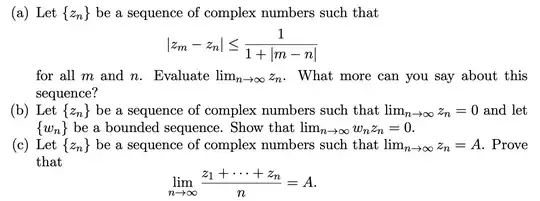Attempt:
(a) If $m>n$, Notice that $\dfrac{1}{1+|m-n|} < \dfrac{1}{|m-n|} < \dfrac{1}{m-n} < \dfrac{1}{n} $. So that if choosing $N > 1/\epsilon$ then we obtain $|z_m-z_n| < \epsilon$ so (z_n) is cauchy so convergent. I claim that limit is $0$. We need to observe that as $n$ gets large, the separation of the terms of the sequence gets smaller. In fact, if $m = 2n $, then
$$ |z_{2n} - z_n | < \dfrac{1}{1+n} < \dfrac{1}{n} \to \infty $$
Im having some difficulties making this formal. Any suggestion?
As for (b), we know $|w_n| < B$ for all $n$ and after some $N$, we have that $|z_n| < \epsilon / B $. So, with this same $N$, we obtain that
$$ | w_n z_n | < B \cdot \frac{ \epsilon }{B} = \epsilon $$
and we have the result.
(c). We can find $N$ so that for $n>N$ we have $|z_n - A| < \epsilon $
So that with this same $N$, we have
$$ \left| \dfrac{ z_1 + ... + z_n }{n } - A \right| = \left| \dfrac{ z_1+...+z_n - n A }{n} \right| \leq \dfrac{ \sum_{i=1}^n |z_i - A | }{n} \leq \dfrac{ n \sup_{n \in \mathbb{N} } |z_n - A | }{n} < \epsilon$$
and result follow. Is this a valid argument?
